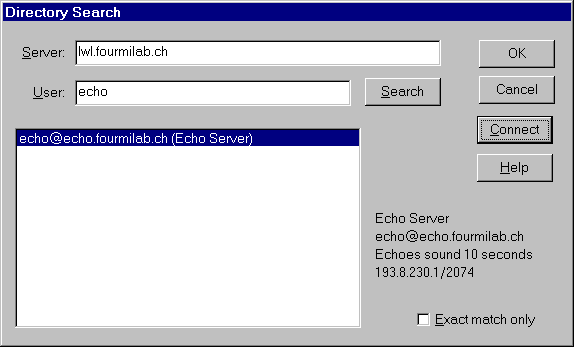

Speak Freely's "Look Who's Listening" facility allows Speak Freely users to publish their E-mail and Internet addresses and optional additional information on a server accessible to other users. You can query a Look Who's Listening Server with the Phonebook/Search... menu item.
The "Server" specifies the host name or Internet address of a Unix site running the server you wish to query. If you've published your directory entry on a server, the same server is used as the default for searches. A public Look Who's Listening server is available at the site:
lwl.fourmilab.ch Switzerland
As with everything on the Internet, servers are in a constant state of flux. For up to date information on available servers consult the Speak Freely World-Wide Web page http://www.fourmilab.ch/speakfree/windows/. It's generally best to publish your directory information on a nearby server. Remember that each server is independent; you only see users who have published their address on that server. If you want to communicate regularly with someone, it's best to agree to meet on the same server.
When you first connect to a server, the text box at the bottom left will show the server's welcome message, if any. This message usually identifies the server and indicates the location on the World-Wide Web where it publishes a list of all active Speak Freely users who have published directory entries there.
To look for an on-line user, enter the user's E-mail address in the "User" box and press "Search". If the user did not check "Exact match only" in the Phonebook/Edit Listing... dialogue and you did not check "Exact match only" in this dialogue box, all entries that contain the characters you entered in the "User" box within the E-mail address or Full name fields are returned, up to a limit of 5 to 10 depending on the length of the entries. The server is intended to find individual users, not provide a "wild card" list of a large number of active sites; consult the World-Wide Web document indicated by the server in its welcome message for a list of all active sites.